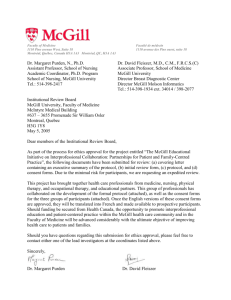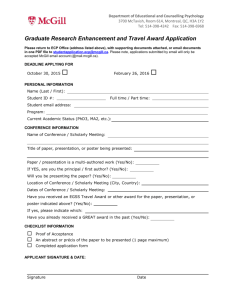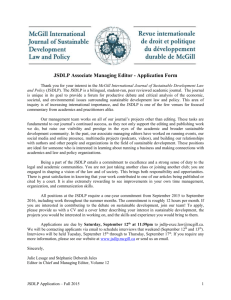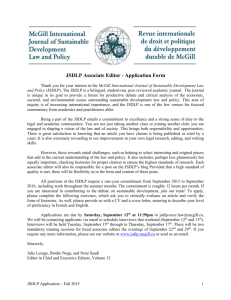neurobiological aspects of behavior
advertisement
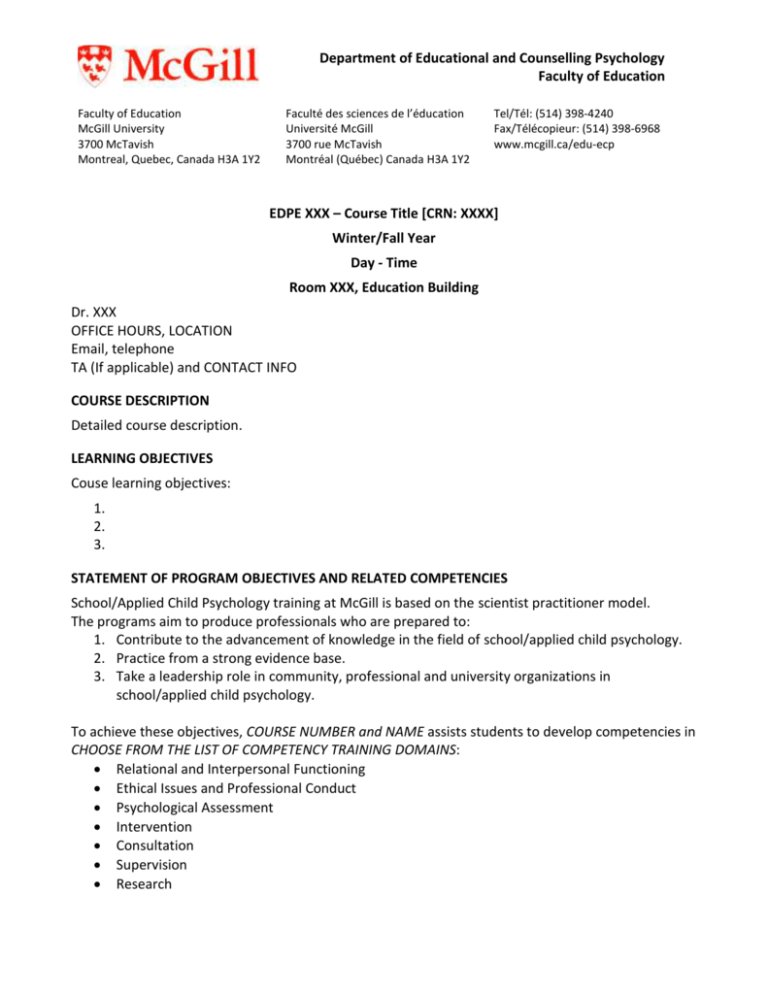
Department of Educational and Counselling Psychology Faculty of Education Faculty of Education McGill University 3700 McTavish Montreal, Quebec, Canada H3A 1Y2 Faculté des sciences de l’éducation Université McGill 3700 rue McTavish Montréal (Québec) Canada H3A 1Y2 Tel/Tél: (514) 398-4240 Fax/Télécopieur: (514) 398-6968 www.mcgill.ca/edu-ecp EDPE XXX – Course Title [CRN: XXXX] Winter/Fall Year Day - Time Room XXX, Education Building Dr. XXX OFFICE HOURS, LOCATION Email, telephone TA (If applicable) and CONTACT INFO COURSE DESCRIPTION Detailed course description. LEARNING OBJECTIVES Couse learning objectives: 1. 2. 3. STATEMENT OF PROGRAM OBJECTIVES AND RELATED COMPETENCIES School/Applied Child Psychology training at McGill is based on the scientist practitioner model. The programs aim to produce professionals who are prepared to: 1. Contribute to the advancement of knowledge in the field of school/applied child psychology. 2. Practice from a strong evidence base. 3. Take a leadership role in community, professional and university organizations in school/applied child psychology. To achieve these objectives, COURSE NUMBER and NAME assists students to develop competencies in CHOOSE FROM THE LIST OF COMPETENCY TRAINING DOMAINS: Relational and Interpersonal Functioning Ethical Issues and Professional Conduct Psychological Assessment Intervention Consultation Supervision Research COURSE MATERIALS Required course materials e.g. textbooks etc. Major issues for accrediting bodies are that readings represent evidence-based practice, information based on strong theory and research, and readings that are current. Although seminal readings are a large part of some courses, exemplars from readings that are less than 5 years are ideal. RECOMMENDED JOURNALS List of relevant academic journals related to course content. COURSE SCHEDULE and READINGS (subject to change) Date Topic Notes COURSE EVALUATION Assignments, due dates. GRADE DISTRIBUTION http://www.mcgill.ca/study/20122013/university_regulations_and_resources/graduate/gps_gi_grading_and_grade_point_average POLICY Academic Integrity. McGill University values academic integrity. Therefore, all students must understand the meaning and consequences of cheating, plagiarism and other academic offences under the Code of Student Conduct and Disciplinary Procedures (see www.mcgill.ca/integrity for more information). Disability. If you have a disability please contact the instructor to arrange a time to discuss your situation. It would be helpful if you contact the Office for Students with Disabilities at 398-6009 or online at http://www.mcgill.ca/osd before you do this. Additional policies: Additional policies governing academic issues which affect students can be found in the Handbook on Student Rights and Responsibilities, Charter of Students’ Rights (online at http://www.mcgill.ca/deanofstudents/rights/). In accord with McGill University’s Charter of Students’ Rights, students in this course have the right to submit in English or in French any written work that is to be graded. MERCURY ONLINE EVALUATIONS Students are strongly encouraged to fill out the online evaluation for this course at the end of term. Online course evaluations serve primarily as a tool towards teaching improvement, informing students about courses, and as one of the elements for evaluating the teaching performance of staff for reappointment, tenure and promotion purposes. For more information consult the following link: http://www.mcgill.ca/tls/teaching/course-evaluations/resources/period Course Title 2 Semester 20XX IMPORTANT DATES http://www.mcgill.ca/edu-ecp/resources/instructor/guidelines#dates Course Title 3 Semester 20XX
